Key takeaways:
- Day trading involves quick decision-making and emotional control, emphasizing the importance of staying calm and analytical.
- Education is crucial, enabling traders to understand market dynamics and their emotional responses, leading to more informed decision-making.
- Setting realistic goals and managing risks through strategies like stop-loss orders and portfolio diversification are essential for long-term success in trading.
- Learning from mistakes is vital; reflecting on past trades can transform losses into opportunities for growth and improvement.
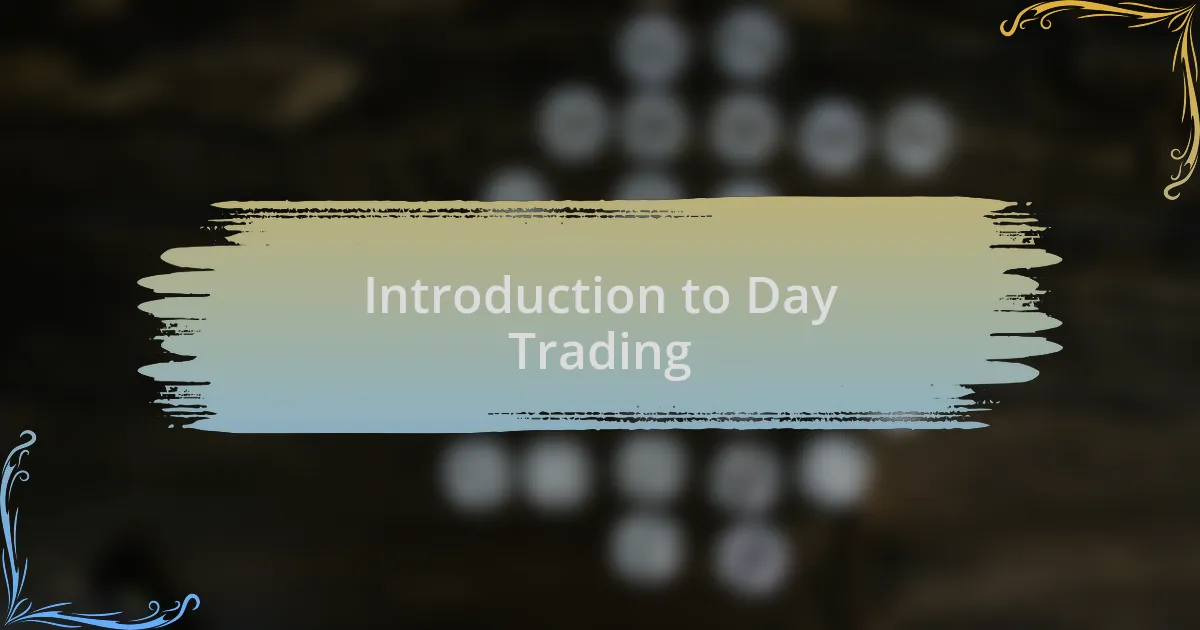
Introduction to Day Trading
Day trading, at its core, involves buying and selling assets within a single trading day, aiming to capitalize on short-term price movements. I remember my first experience with day trading; it felt like riding a rollercoaster, full of excitement and anxiety. Have you ever felt that rush of adrenaline when you see the market change in an instant?
One crucial aspect of day trading is the need for quick decision-making. There were days when I had to make rapid choices based on gut feelings or chart patterns I had studied. How do you think you would handle the pressure of a ticking clock while analyzing trends? It can be exhilarating but also nerve-wracking.
I’ve found that successful day trading requires not just knowledge but emotional control. Early on, I learned that letting fear or greed drive my decisions could lead to mistakes I would regret. Have you ever made a decision based on impulse rather than logic? In day trading, taking a step back and analyzing the situation calmly is vital for long-term success.

Understanding Crypto Basics
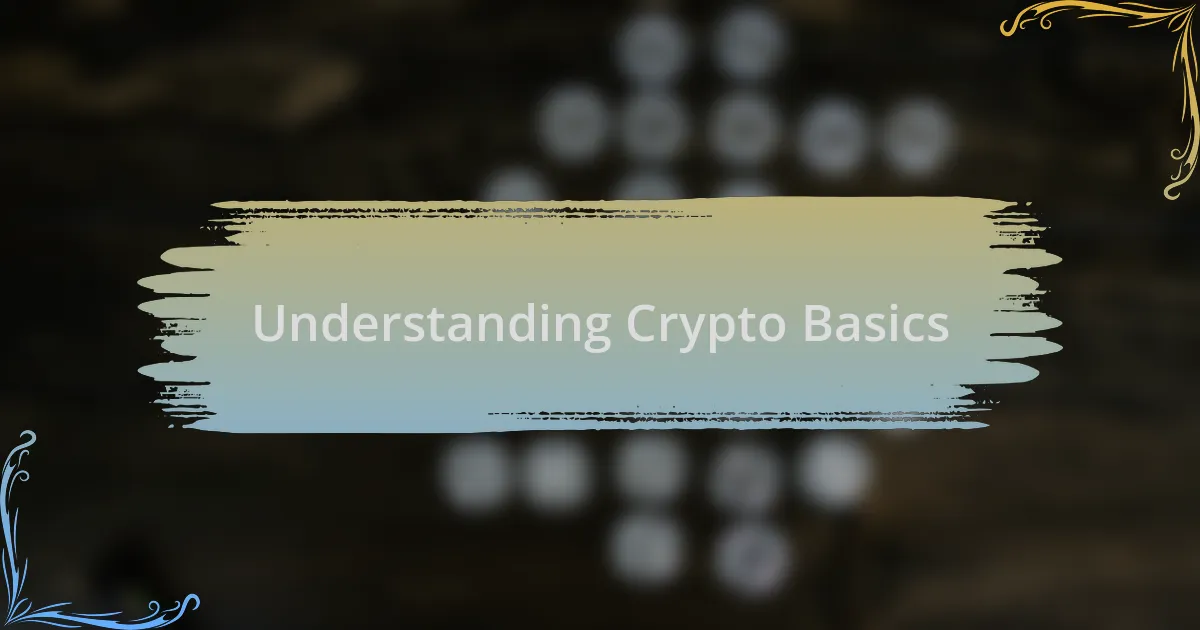
Understanding Crypto Basics
Crypto, short for cryptocurrency, is a form of digital or virtual currency that uses cryptography for security. I remember when I first stumbled upon the term; it felt overwhelmingly complex, like a secret code waiting to be broken. Have you ever encountered something that seemed intimidating but turned out to be fascinating once you understood it better?
The underlying technology of crypto is called blockchain, which is a decentralized ledger that records all transactions across a network. In my experience, grasping this concept was a game changer. It made me appreciate how cryptocurrencies like Bitcoin and Ethereum function without the need for banks or governments. This idea may sound a bit wild, but once I wrapped my head around decentralization, my excitement level soared.
Another interesting feature of cryptocurrencies is their volatility. The prices can swing dramatically in a matter of hours, and I recall days when I couldn’t believe my eyes as numbers shot up or plummeted. Wouldn’t it be thrilling to see your investment double overnight? Just remember, this potential for quick gain comes with risks, and having a solid understanding of the basics is essential for navigating the crypto world safely.
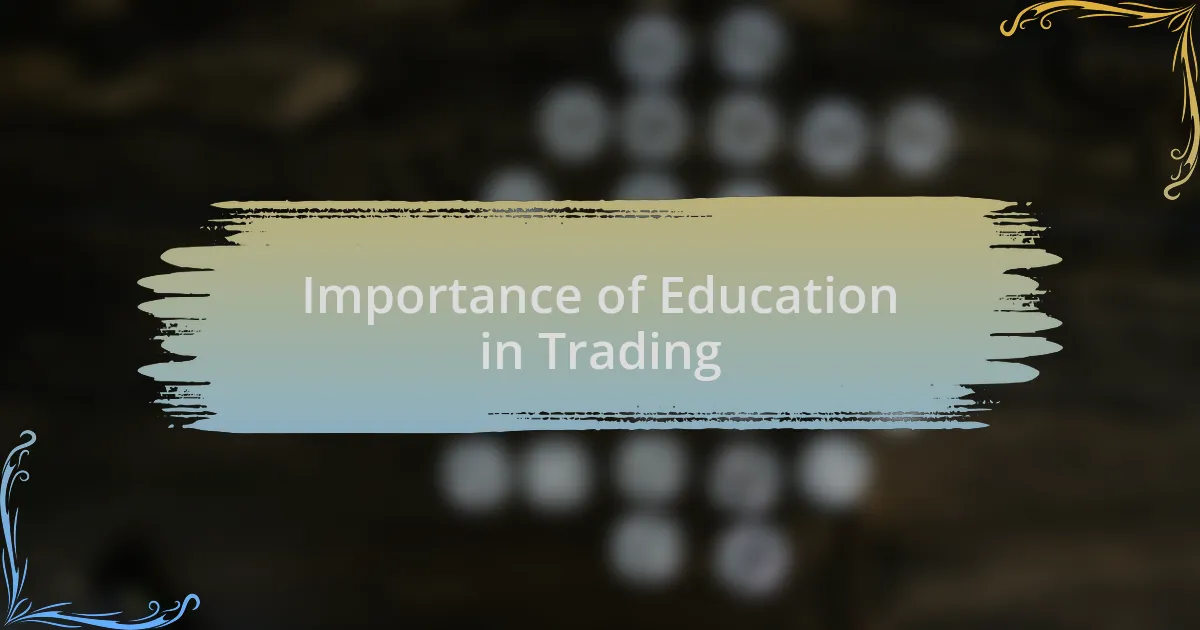
Importance of Education in Trading
Education is crucial in trading, especially in a dynamic field like cryptocurrency. I often think back to my early days of trading, where a lack of knowledge led to more losses than wins. Does that sound familiar? It’s easy to get swept away by the excitement and make hasty decisions without understanding the intricacies of the market.
When I finally took the time to educate myself, everything clicked into place. I studied trading strategies, learned from both successes and failures, and started to see patterns in the market. Can you imagine how empowering it felt to approach each trade with confidence rather than fear? The depth of knowledge transformed my trading approach and diminished the anxiety that comes with uncertainty.
Additionally, education helps us understand our own emotions in trading. I remember grappling with feelings of greed and fear during volatile periods. By learning about market psychology, I began to recognize these emotions and respond more logically. Doesn’t it feel more satisfying to make decisions based on insight rather than impulse? That shift can profoundly impact a trader’s journey.
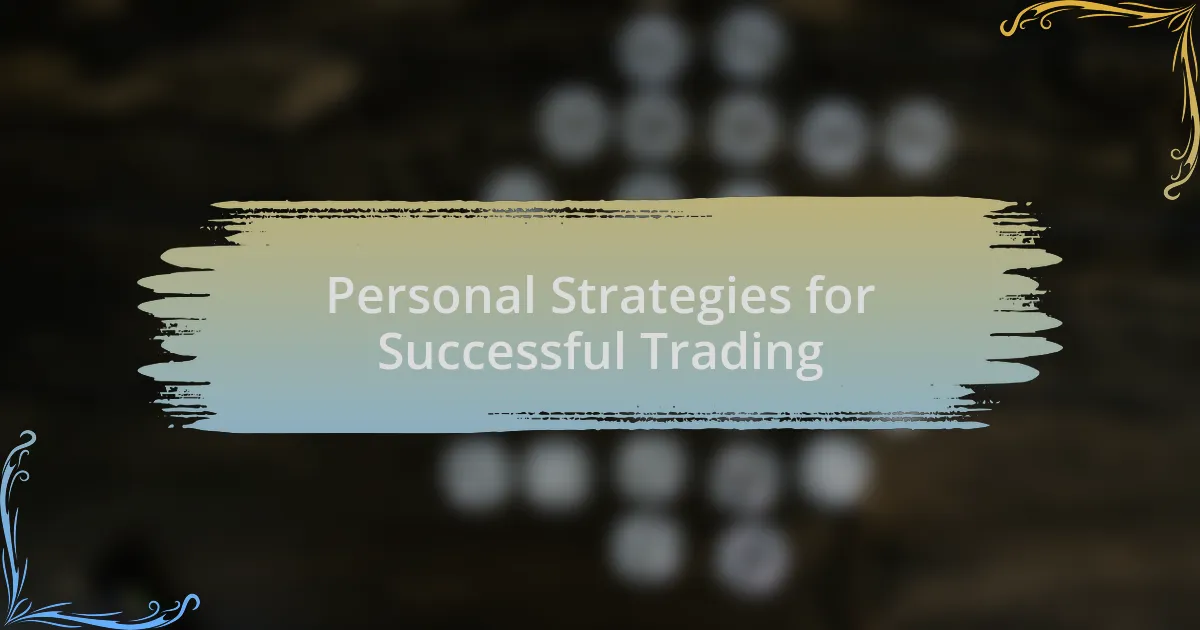
Personal Strategies for Successful Trading
One strategy that has truly worked for me is setting strict rules for my trades. I remember a time when I impulsively bought a coin after seeing a spike in its price, only to watch it plummet hours later. Now, I stick to my plan: I only enter trades based on specific criteria, which helps me filter out the noise. Do you ever find yourself caught up in the heat of the moment? Having clear entry and exit points keeps me grounded.
Another method I’ve found invaluable is journaling my trades. In my trading notebook, I detail what strategies I used and what emotions I felt at each step. It was eye-opening to see patterns in my decision-making, especially when I noticed I tended to make riskier moves during market highs. Have you ever reflected on your trading behavior? This practice not only enhances my discipline but also serves as a great learning tool for future trades.
Finally, I think it’s vital to embrace continuous learning. Every market shift brings new lessons. Early on, I underestimated how quickly trends could change, leading to missed opportunities. By staying updated with market news and following expert analysts, I’ve expanded my knowledge. Isn’t it amazing how much we can learn just by being curious? Embracing this mindset allows me to adapt my strategies effectively and stay ahead in the ever-evolving crypto landscape.
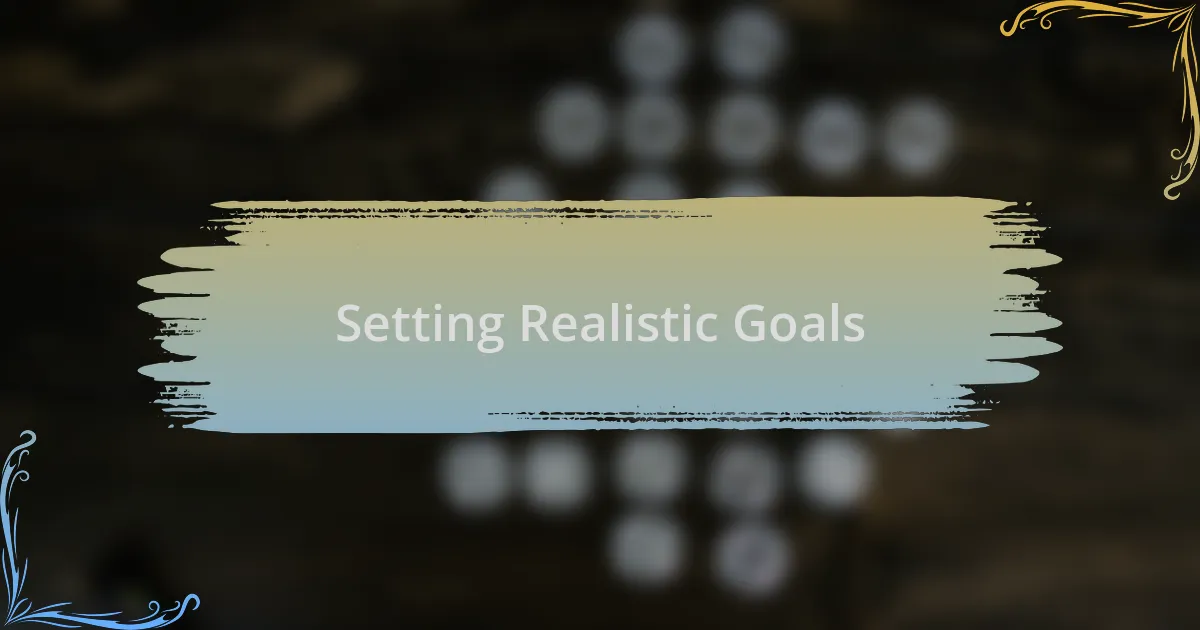
Setting Realistic Goals
Setting realistic goals is essential for maintaining a level head while trading. I recall when I first started, I dreamed of doubling my investment within weeks. Instead, I learned that aiming for steady, manageable returns helped me avoid unnecessary stress and disappointment. Have you ever set your sights too high and felt crushed when reality didn’t match your expectations?
Breaking my larger goals into smaller, achievable milestones has been a game changer for me. Celebrating these small victories keeps me motivated. For instance, reaching a specific profit target or mastering a new trading strategy brought a sense of accomplishment that kept me going. Have you experienced that rush of joy after ticking off a goal on your list?
It’s also important to be flexible with my goals. Markets are unpredictable, and I’ve had to adjust my targets based on new information or changes in trends. When I accepted that my original plans might need tweaking, I found relief rather than frustration. How adaptable are you when things don’t go as planned? Embracing flexibility has made my trading journey not only more successful but also enjoyable.
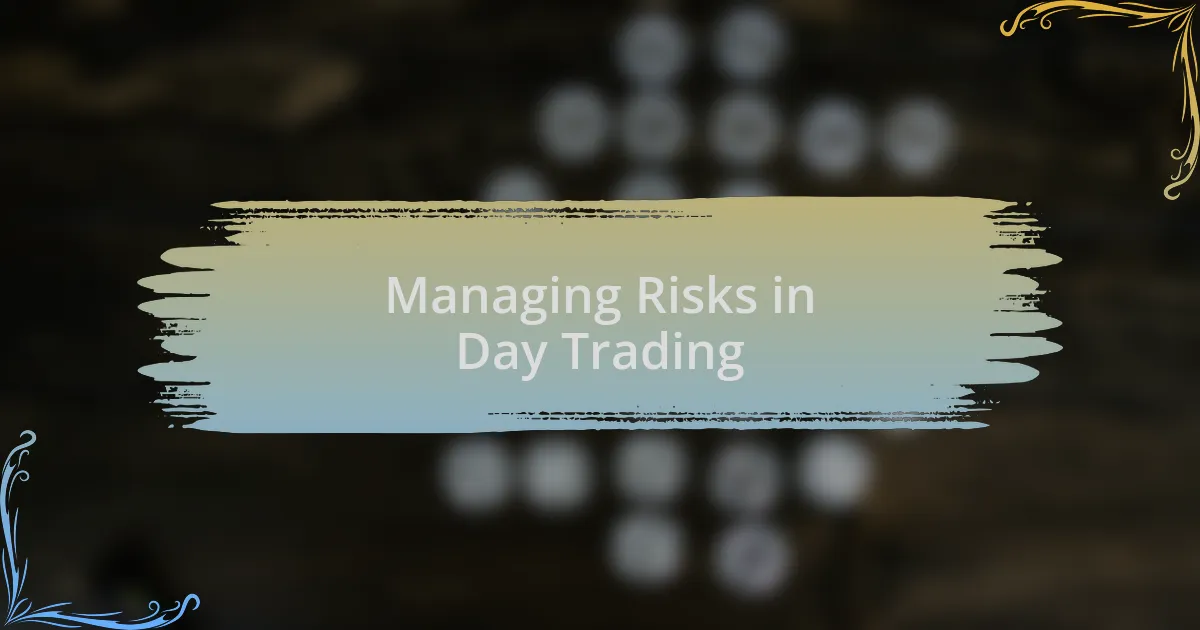
Managing Risks in Day Trading
Managing risks in day trading is crucial for long-term success. I once jumped into a trade too quickly, driven by excitement without fully analyzing potential risks. The result? A sudden loss that made me painfully aware of the importance of having a risk management strategy in place. Have you ever felt the gut-wrenching churn of regret after making a hasty decision?
I learned to set strict stop-loss orders as a protective measure. It’s like wearing a seatbelt in a car—you may never need it, but when the unexpected happens, you’ll be glad you have it. This practice has saved me from significant losses multiple times. How often do you think about safeguarding your investments?
Diversifying my portfolio has also been a key approach in reducing risk. Instead of putting all my money into one asset or strategy, I’ve spread it across different cryptocurrencies. This way, if one trade doesn’t go as planned, the impact on my overall investment is minimized. Have you considered this method to help stabilize your trading experience?
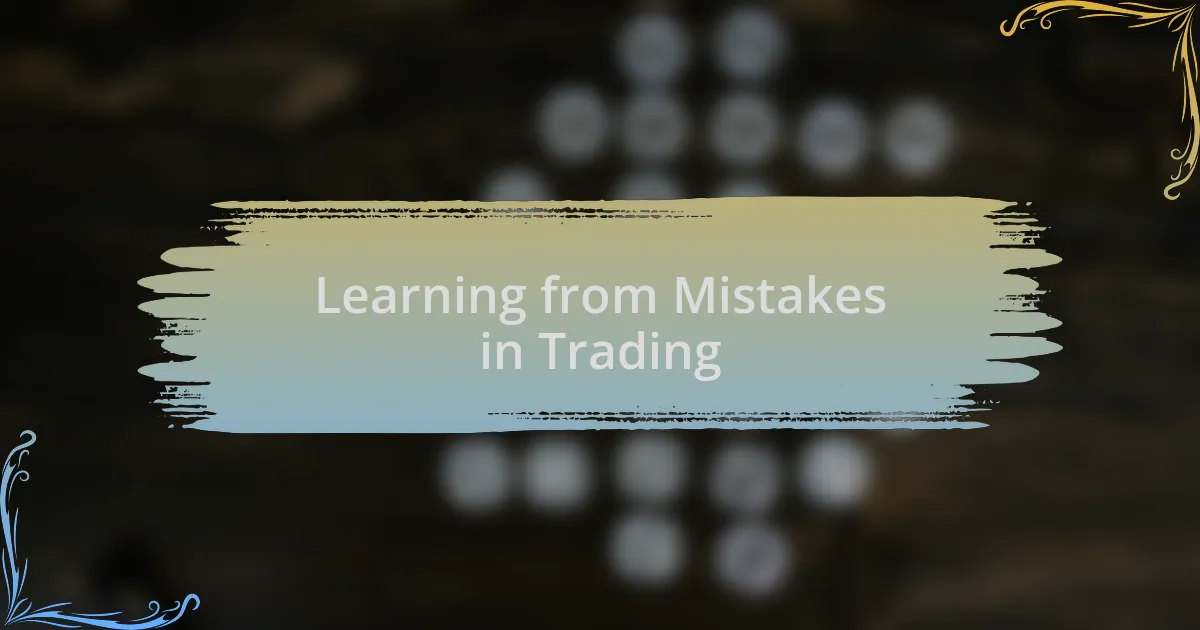
Learning from Mistakes in Trading
Making mistakes is part of the learning curve in trading. I remember one instance when I convinced myself I had found the perfect entry point for a trade. As it turned out, I hadn’t done my homework thoroughly, and the price tanked not long after. That moment was a bitter lesson in the value of proper research before taking action. Have you ever rushed in, only to watch your hard-earned money slip away?
In my experience, reflecting on past trades has been transformative. After a particularly challenging week of losses, I took some time to analyze what went wrong. I realized that I had ignored my own indicators and let emotions cloud my judgment. This reflection was like turning on a light in a dark room, guiding me toward a more disciplined approach. How often do you stop to really think about what your trades teach you?
The best part about mistakes is that they can sharpen our instincts if we allow them to. I’ve come to see my losses not as failures but as opportunities for growth. Each setback nudges me to refine my strategy and become more resilient. Have you tried viewing your trading mistakes as stepping stones toward becoming a more seasoned trader?